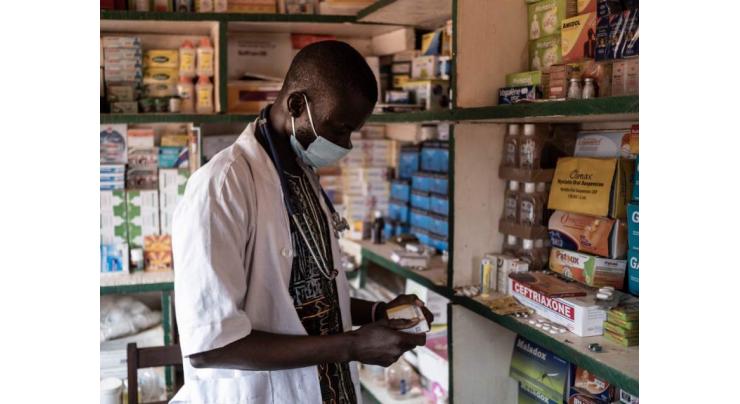
In C.Africa, Informal Pharmacies Provide A Health Safety Net Of Sorts
Faizan Hashmi Published April 19, 2023 | 07:04 PM

Yaguina Nesly waits outside a hut whose walls of corrugated steel are daubed in green and white paint
Bangui, Central African Republic, (APP - UrduPoint / Pakistan Point News - 19th Apr, 2023 ):Yaguina Nesly waits outside a hut whose walls of corrugated steel are daubed in green and white paint.
It is one of a large number of unlicensed pharmacies in Bangui, the capital of the Central African Republic (CAR) -- outlets for cheap medication for the city's many poor.
Informal pharmacists, known as "doctas," flourish here, despite worries that they dispense counterfeit drugs, offer flawed medical advice and foster antibiotic resistance.
"I always buy my drugs here, because in hospital you can only get an appointment if you're lucky," says Nesly, 23, her nine-month-old baby swathed on her back.
"I prefer to come to my neighbourhood docta. It's faster and cheaper." Inside the makeshift structure, Stephen Liosso-Pivara-Bembe, 33, hands her pills for stomach pains.
Wearing a white coat and with a stethoscope slung around his neck, Liosso-Pivara-Bembe says he started medical school but never finished because he ran out of money.
He works seven days per week in the store, which is decorated with pictures of yellow pills and a sign in white letters reading: "Health First." People from wealthier economies may sneer or be shocked that illicit pharmacies openly trade like this.
But in the impoverished CAR, doctas are widely appreciated for providing a rough-and-ready safety net for health.
The landlocked country is struggling with a decade-long civil conflict, and ranks the second poorest country in the world in the UN's 189-nation Human Development Index.
It has just 0.1 doctors per 1,000 people -- 30 or 40 times fewer than countries in Western Europe, according to World Bank statistics.
Around 70 percent of medical care is provided by humanitarian organisations -- 2.7 million people, or around half the population, are in need of health assistance, according to the UN's Office for the Coordination of Humanitarian Affairs (OCHA).
There are no official figures for the number of doctas, but as an anecdotal guide, AFP counted 10 of the illegal pharmacies just in one major street in a rundown district.
Here, long lines of people form, especially in the evening.
In Bangui's fifth district, Antoine Bissa, a 39-year-old student nurse, was hard at work in a store named Biba Pharma.
He said he treated around 100 people per day "for injections and drugs," working until 11 pm. He said the business was the sole source of revenue to support his four children.
Related Topics
Recent Stories

Currency Rate In Pakistan - Dollar, Euro, Pound, Riyal Rates On 4 May 2024

Today Gold Rate in Pakistan 04 May 2024

Pakistan marks World Press Freedom Day

High-level Saudi business delegation due on May 5

Stocks heat up as US labour market cools

President approves Tax Laws (Amendment) Bill 2024

Implementation of merit, justice to oppressed segments top priorities: CPO

Overseas Kashmir community delegation calls on AJK President, discusses latest s ..

Govt believes in freedom of press: Amir Muqam

Labour urges UK election after Tory losses

Health authorities asked for action against alleged illegal tenders at Services ..

Spain scraps national bullfighting prize sparking debate
More Stories From World
-
Dams strain as water, death toll, keep rising in south Brazil
10 minutes ago -
Golf: US PGA Byron Nelson tournament scores
10 minutes ago -
Stocks gain while dollar retreats as US labor market cools
10 minutes ago -
Football: German Bundesliga table
40 minutes ago -
Verstappen takes sprint pole in Miami
1 hour ago -
Dams strain as water, death toll keep rising in south Brazil
1 hour ago
-
Football: German Bundesliga results
8 hours ago -
Auger-Aliassime in final as 'crazy' Madrid injury curse strikes again
8 hours ago -
Football: Italian Serie A result
8 hours ago -
Football: Italian Serie A table
8 hours ago -
Football: French Ligue 1 table
8 hours ago -
Bill May or may not make Olympic history in the pool
8 hours ago